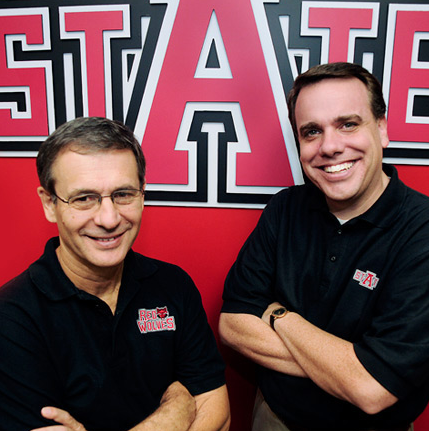A-State Professors Co-Author Winning Business Paper
JONESBORO — Two professors in Arkansas State University’s College of Business recently won the prestigious 2013 Bernard J. LaLonde Best Paper Award, which is given annually to the best paper of the entire year published in the Journal of Business Logistics, the leading academic journal in the world in the area of supply chain management and logistics.
Dr. Shane Hunt, dean of the College of Business, and Dr. John Mello, director of the Center for Supply Chain Management and associate professor of marketing, co-authored the article titled, “Combining Formal Controls to Improve Firm Performance.” The article, one of three finalists, was part of a multi-year research effort between Hunt and Mello and two colleagues at Ohio State University that produced three other "A" level articles over the past couple of years.
This major research award reflects the faculty and student success for the Center for Supply Chain Management, widely viewed as one of the top 50 logistics programs in the country.
According to the abstract, formal controls are an essential part of organizational design and are theorized to positively influence organizational performance. Mello and Hunt ([2009] Transportation Journal, 48:20-39) were the first to suggest using formal controls to influence truck drivers' behavior.
Extending the salesperson control literature, the two documented an under-researched method of formal control that is termed technology control, whereby firms use on-board and communications technology to influence drivers. Hunt and Mello built on their work by investigating the contingent effects of formal controls that influence the behavior of truck drivers and thereby influence the operational performance of firms in the U.S. motor carrier industry.
“Our work integrates the monitoring aspect of agency theory with the theory of operant conditioning and the theory of psychological reactance to develop a rationale for hypothesized contingent effects of formal controls on motor carriers' operational performance,” Hunt said. “We collected primary data pertaining to the controls used to influence truck drivers' behavior from a large sample of U.S. motor carrier firms.
“The results of our analyses using nonlinear structural equation modeling suggest a complex set of relationships between formal controls and operational performance. Our results shed light on scenarios where using technology to monitor driver behavior can result in positive and/or negative organizational outcomes.”
“It has been my great pleasure to work with Dr. Hunt on a number of projects over the past seven years,” said Mello. “This includes the marketing textbook we co-wrote, published by McGraw-Hill, as well as many published articles and service activities. I look forward to continuing our close collaboration in the coming years.”






